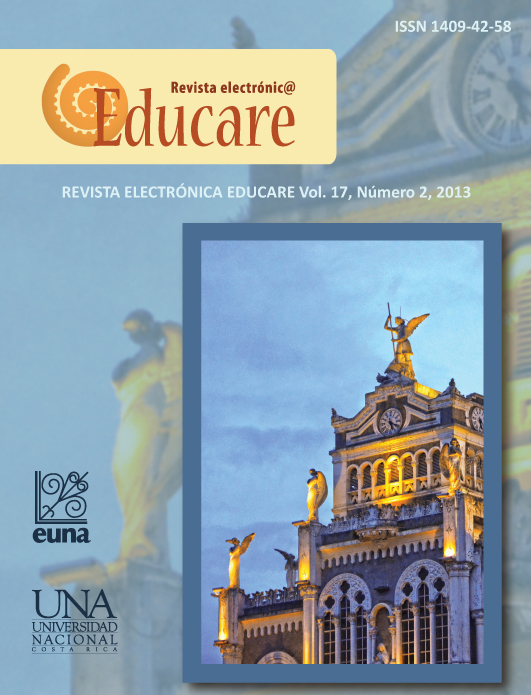Attitude towards Teaching, Comprehensive Formation, and Students’ Life Project: The point of view of a group of students from the 11th grade in rural schools
DOI:
https://doi.org/10.15359/ree.17-2.6Keywords:
Attitude, education, attitude towards teaching, stimulus, motivationAbstract
This paper refers to a cross-sectional descriptive study with a quantitative approach on the point of view of students from rural areas concerning teaching, comprehensive formation of students from the 7th to 11th grades and the students’ life project. The study was conducted in 2011 with the participation of 41 students from the 11th grade of the Costa Rican rural schools involved in the Esperanza Joven program of the School of Educology of the Universidad Nacional. The information was collected through a Likert scale. The results reported a positive attitude towards teacher’s performance, comprehensive formation, evaluation of learning, family and institutional stimulus, and personal goals. In contrast, there was a negative attitude about the motivation of the school to its students. This research included an objective analysis and provided accurate conclusions.
References
Alonso, J. y Montero, I. (1990). Motivación y aprendizaje escolar. En C. Coll, J. Palacios y Á.
Marchesi (Comps). Desarrollo psicológico y educación 2: Psicología de la educación escolar
(2ª ed., pp. 183-198). Madrid: Alianza Editorial.
Carranza, G. (2005). El desempeño docente en el proceso de enseñanza aprendizaje. UMBRAL.
Revista de Educación, Cultura y Sociedad, 5(8), 170-172). Recuperado de http://sisbib.
unmsm.edu.pe/BibVirtualdata/publicaciones/umbral/v05_n08/a21.pdf
Coll, C., Martín, E. y Onrubia, J. (2001). La evaluación del aprendizaje escolar: Dimensiones
psicológicas, pedagógicas y sociales. En C. Coll, J. Palacios y A. Marchesi (Comps.).
Desarrollo psicológico y educación 2. Psicología de la educación escolar (pp. 549-572).
Madrid: Alianza.
De la Cruz Quintanilla, L. (2007). Diccionario de educación. Lima, Perú: s. e.
Espinal, C. A. (2003). La educación integral en las escuelas secundarias. México: Monografias.com.
Recuperado de http://www.monografias.com/trabajos39/educacion-integral/educacionintegral2.shtml
Gaitán, C., Campos, R., García, L., Granados, L., Jaramillo, L. y Panqueva, J. (2005). Prácticas
educativas y procesos de formación en la educación superior. Bogotá: Pontificia Universidad
Javeriana.
García, K. (2010). La evaluación como proceso de construcción de los aprendizajes. Medellín:
[Editorial].
Hill, N. y Stone, W. C. (2003). La actitud mental positiva. Un camino hacia el éxito. Rosario
Argentina. Edición digital Bilioteca de la Nueva Era.
Institución EducativaTécnica Comercial Caldas. (s. f.) Motivaciónhaciaelaprendizaje. Recuperado
de http://ietccaldasguamo.wordpress.com/directiva/clima-escolar/motivacion-hacia-elaprendizaje/
Ministerio de Educación Pública, República de Costa Rica (2007). Ley fundamental de
educación. San José, Costa Rica, Autor. Recuperado de http://www.bcn.cl/carpeta_
temas_profundidad/temas_profundidad.2007-08-29.4296398389/legislacion-extranjera/
ley%20fundamental%20de%20educacion_costa%20rica%20.pdf
Muñoz, B. (30 de enero de 2010). Desempeño docente Vs rendimiento escolar. [Mensaje en un
blog] Tomado de http://evaluadoresacreditadores.blogspot.com/2010/01/desempenodocente-vs-rendimiento.html
Resolución N° 0229 (03 diciembre, 1999). Colegio la enseñanza pre-escolar, básica primaria y
bachillerato de la Secretaría Distrital de Educación y Cultura de Cartagena. Recuperado
de http://www.colegiolaensenanza.edu.i8.com/incentivos.htm
Reyes, L. A. (2006). Estándares de desempeño docente. Chile: Ediciones Universidad Católica Silva
Henríquez. Santiago. Recuperado de http://www.oei.es/docentes/articulos/estandares_
desempeno_docente_reyes.pdf
Ruiz, J. C., Álvarez, N. y Pérez, E. (2008). La orientación socio-humanística, un aporte a la
formación integral del estudiante. Tendencias Pedagógicas, 13, 175-191. Recuperado de
www.tendenciaspedagogicas.com/Articulos/2008_13_09.pdf
Downloads
Published
How to Cite
Issue
Section
License
1. In case the submitted paper is accepted for publication, the author(s) FREELY, COSTLESS, EXCLUSIVELY AND FOR AN INDEFINITE TERM transfer copyrights and patrimonial rights to Universidad Nacional (UNA, Costa Rica). For more details check the Originality Statement and Copyright Transfer Agreement
2. REUTILIZATION RIGHTS: UNA authorizes authors to use, for any purpose (among them selfarchiving or autoarchiving) and to publish in the Internet in any electronic site, the paper´'s final version, both approved and published (post print), as long as it is done with a non commercial purpose, does not generate derivates without previous consentment and recognizes both publisher's name and authorship.
3. The submission and possible publication of the paper in the Educare Electronic Journal is ruled by the Journal’s editorial policies, the institutional rules of Universidad Nacional and the laws of the Republic of Costa Rica. Additionally, any possible difference of opinion or future dispute shall be settled in accordance with the mechanisms of Alternative Dispute Resolution and the Costa Rican Jurisdiction.
4. In all cases, it is understood that the opinions issued are those of the authors and do not necessarily reflect the position and opinion of Educare, CIDE or Universidad Nacional, Costa Rica. It is also understood that, in the exercise of academic freedom, the authors have carried out a rogorous scientific-academic process of research, reflection and argumentation thar lays within the thematic scope of interest of the Journal.
5. The papers published by Educare Electronic Journal use a Creative Commons License:














 The articles published by Educare Electronic Journal can be shared with a Creative Commons License:
The articles published by Educare Electronic Journal can be shared with a Creative Commons License: 



